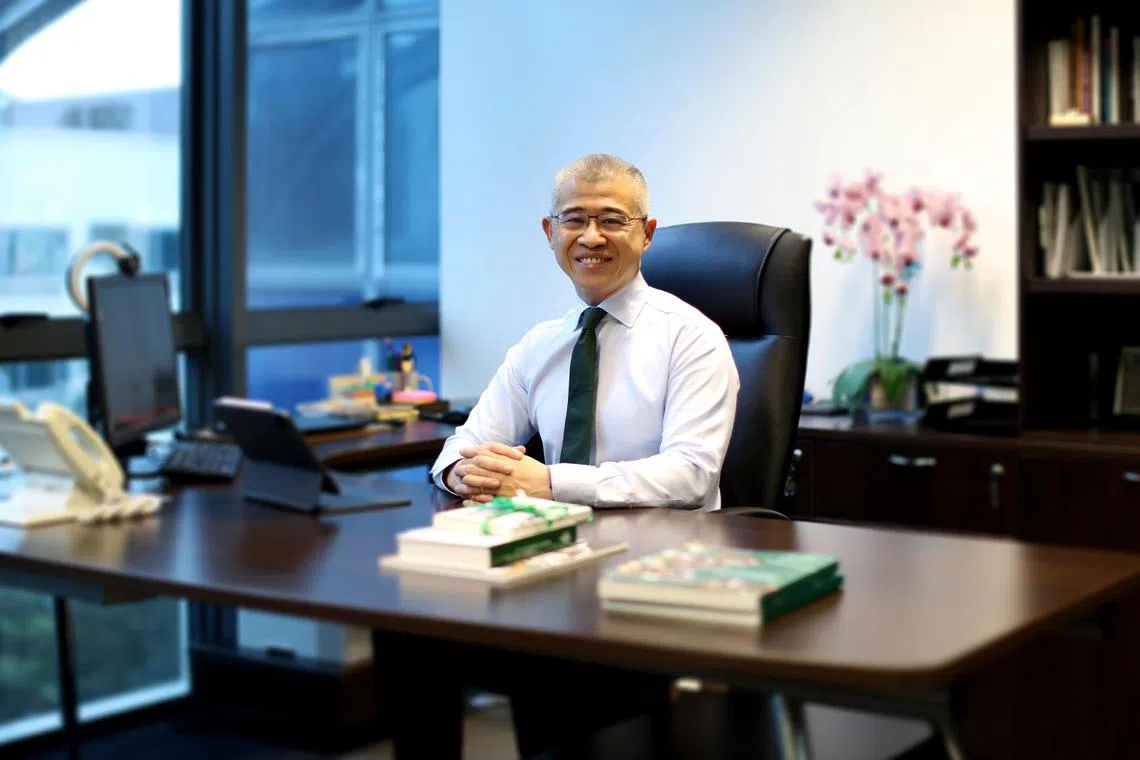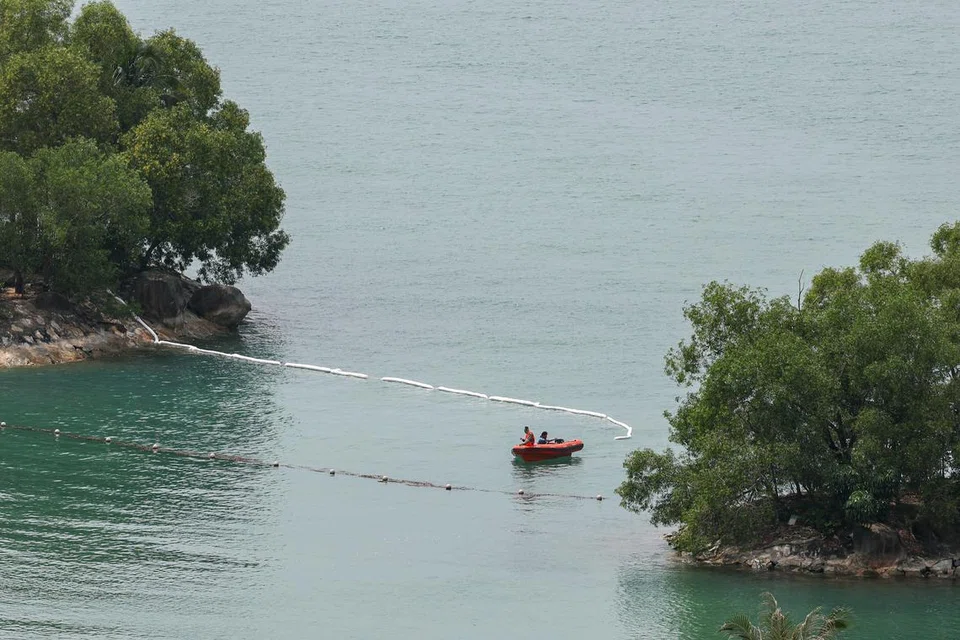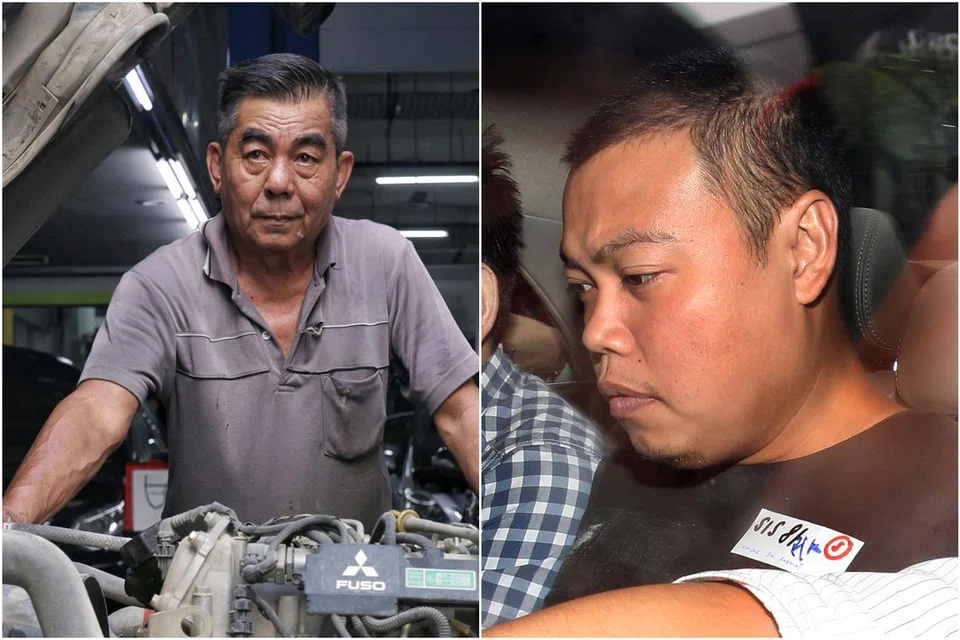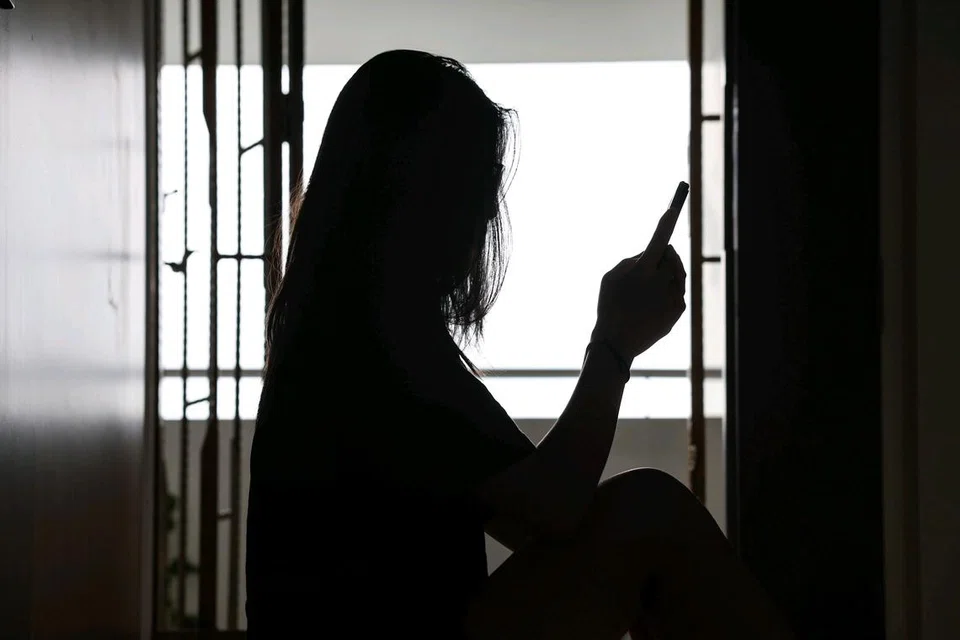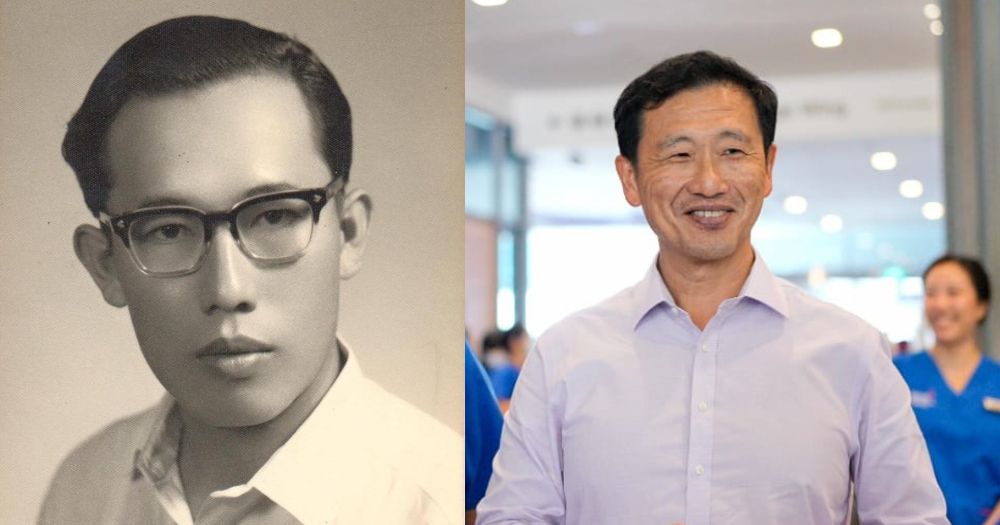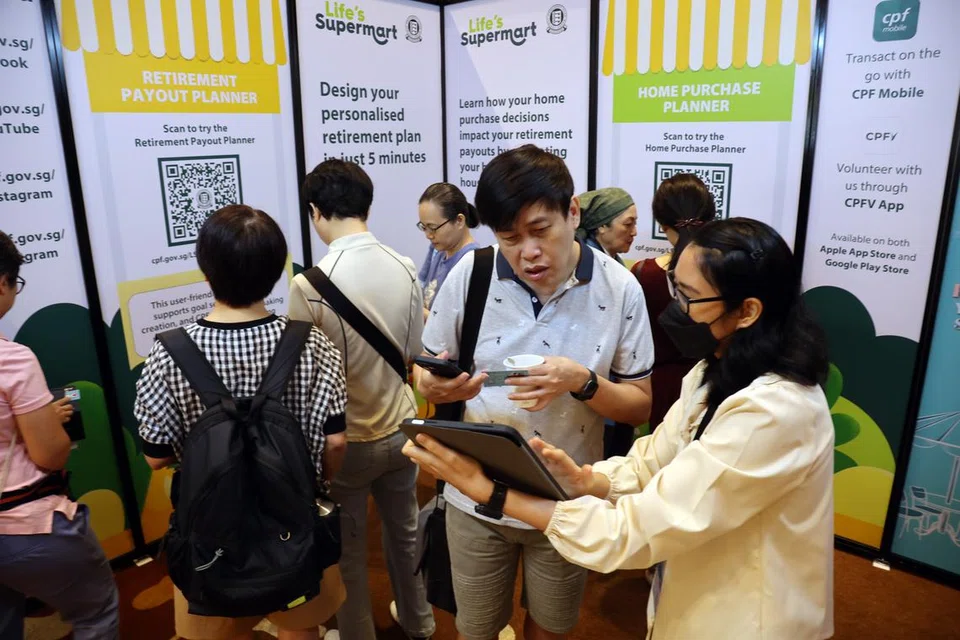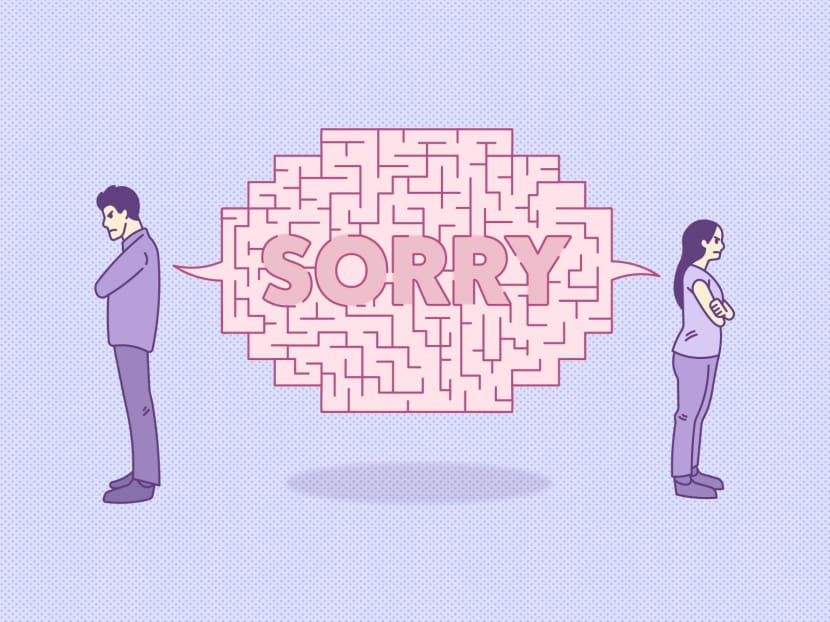This 'Strava artist' draws using his run route, with the streets of Tampines his canvas
We go for a run with Toh Cheng Hock to see how he turns a mundane run into a fancy work of art.
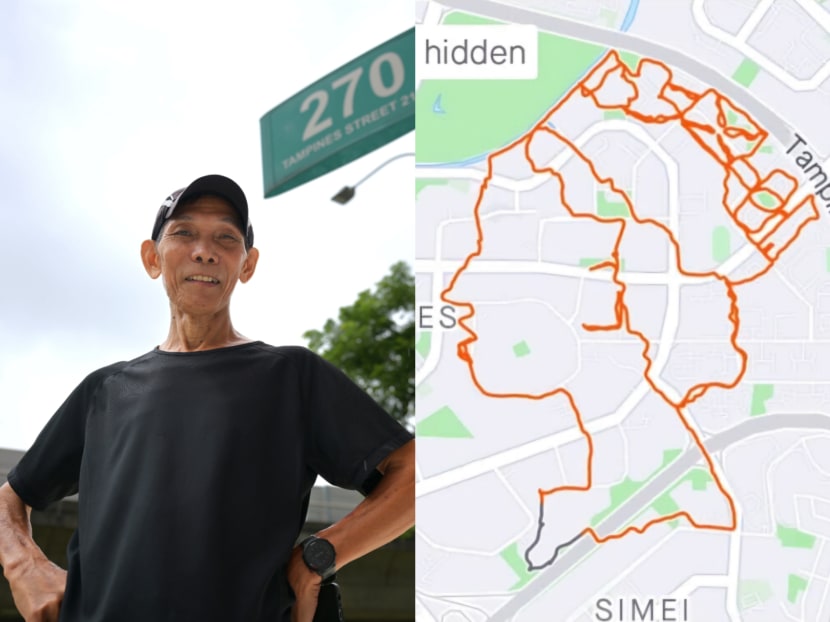
Strava artist Toh Cheng Hock (left) with one of his running potraits of the late Queen Elizabeth II. (Photos: CNA/Raydza Rahman, Tan Cheng Hock)
The run started innocently enough on the pavement, but after a few meters, 71-year-old Toh Cheng Hock turned sharply onto a grass verge of an HDB estate, then through several void decks, jumping over drains and weaving between parked cars.
Though I had some years of running under my belt, what I thought would be an easy morning jog with Toh quickly turned into a muddy affair I felt ill-prepared for.
Turns out, there is a reason why most of his runs do not follow the otherwise seamless pavements – he's working on his latest art piece, where his legs are his brush and the streets of Tampines his canvas.
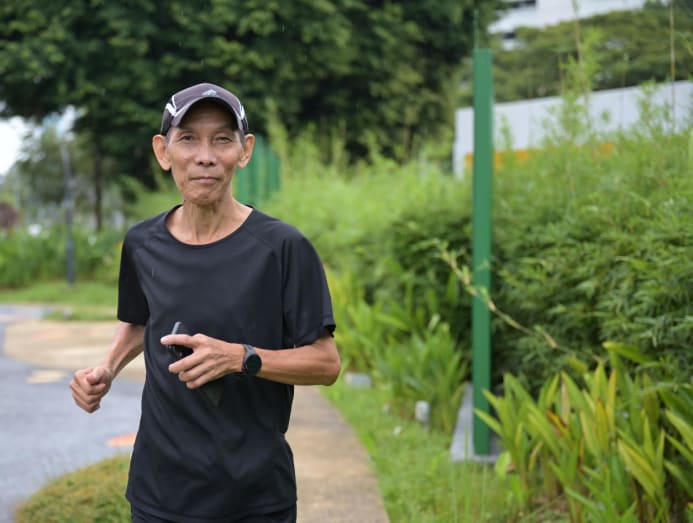
Instead of using paint, Toh uses his running route to draw intricate and complex artwork of anything from numbers and words to animals and even human figures.
Such a practice is known informally as "Strava art", as those who create such drawings with their runs often share them on fitness application Strava.
And while he has been perfecting his craft over the last 10 years, it was only recently that he gained prominence, when his drawing of the numbers "2025" in the shape of a snake during a 21km run went viral.
His post on the Facebook group Strava Art on Jan 1 has since garnered 57,000 likes and over 700 shares.
Some were baffled by the effort. "The longer I look at this, the more questions I have," wrote one commenter.
And so, I decided to reach out to Toh to join him for a run to see for my own eyes how it was done.
GUIDED BY INSTINCT AND EXPERIENCE
Though there was a light rain, Toh was already waiting for me at Tampines MRT station at 6am on a Thursday, raring to go.
The first few forays deep into the HDB estates were just the beginning of what felt like a run that would never end, with 60 per cent of it being off-pavement.
But despite the seemingly endless ways one could get lost when they leave a path, Toh was confident at every small turn, most of the time without even looking at his phone for directions.
Having stayed in Tampines all his life, Toh said he knows the area like the back of his hand.
"I am quite familiar with this place, so I usually know where to turn and where to cross, so I treat (Tampines) like a piece of paper, I can cut through any part of this area," he said.
Before long, every road, pavement and HDB estate began to look the same to me. But Toh was still listing out parts of the route and what they were meant to resemble.
"Now we are doing the eyes," he said at one point.
"This is the mouth," he noted as we made a turn.
My legs were becoming wobbly from the many small hills and kerbs we had to trudge over, and we were soaked entirely in rain, sweat and mud. But after almost one-and-a-half hours and over 12km, the run was over.
And we had something to show for – a drawing of a snake with its head along Tampines Ave 9 and its body coiled around Pasir Ris Secondary School.
For Toh, the final "drawing" is what brings him joy. And looking at the cute cartoon snake I had just drawn, I could see why.
"The minute you see the image appear… I feel the satisfaction and I am quite happy (about) that," he said.
A COMING TOGETHER OF INTERESTS
Toh's uncanny inclination for Strava art did not happen overnight.
After our run, he revealed he has been a graphic designer for over 40 years, illustrating and designing the graphics on billboards and advertisements.
And while he is semi-retired, he still works on design projects on a freelance basis.
As such, he is able to visualise a drawing clearly in his mind, and even make minor adjustments along his run.
"I know how to avoid the obstacle and find an alternative route to complete (the drawing)," he said.
His ability to accurately visualise his drawings is coupled with the fact that Toh has been running for over 40 years.
And he is no slouch, running his latest marathon in Hong Kong this month in under four hours and 30 minutes even though he is in his seventies.
It was about six years ago that he noticed runners post their Strava art online, and was then inspired to do the same.
But he doesn't hit the streets on a whim. True to his graphic designer roots, he plans out his runs on his computer – sometimes drawing out an image first, before plotting it on a route mapping application.
"When I have a picture, I will overlay it on the map and from there I adjust the route," he said.
This can take as quickly as one to two hours, to half a day for more complex designs.
With the route downloaded on his phone, he first does a practice run to identify any obstacles such as an unexpected construction site or a drain that is too deep to jump over.
He then runs the route one more time, with all the unexpected obstacles in mind. Should he face more obstacles or if the artwork is not satisfactory, he may even run the route a third time.
"When I make a mistake, I can sometimes still try to cover it up by reversing or redoing that part of the route," he said. "But let's say if the mistake is too obvious, then it can't be helped, I'll have to restart."
All said, a typical piece of Strava art can take him about one week to complete.
FROM THE MERLION TO LEE HSIEN LOONG
Toh's inspiration for his art often comes during festive seasons. During Chinese New Year, he typically draws animals on the Chinese Zodiac, which partly explains why he chose to draw a snake with me.
Christmas will see figures such as snowmen and Santa Claus.
Animals such as a kangaroo, penguin, dogs and tigers have also featured on his runs, as have depictions of people doing various activities such as breakdancing and kung fu. He has even drawn famous figures like the late Queen Elizabeth II.
And during the COVID-19 pandemic, he found even more time to come up with complex drawings.
Among his favorites is a Merlion spouting the words "SG 55", in celebration of Singapore's 55th birthday back in August 2020. The route spanned 45 km and took Toh almost five hours to run.
Another was a 26km run in 2021 depicting a man getting vaccinated. He revealed the man to be then-Prime Minister Lee Hsien Loong, based on a photo of him being inoculated back then.
"That was quite complicated, as human figures are usually quite difficult to draw," he said with a chuckle.
"It took a bit longer (to accomplish)… he was our Prime Minister, so I had to practice slightly longer."
WHAT MAKES SINGAPORE STRAVA ART-FRIENDLY
Toh said that he did not expect his latest Strava art post to go viral, as his past posts had gathered only a few hundred likes at most.
"My friends sent the post to me and told me that I'm very famous," he said with a sheepish grin. "I'm quite shy about it."
While most commenters expressed admiration for Toh's efforts, there were also some who were sceptical, questioning if he had really run the route.
"Just wondering how you run through others' private property," wrote one.
Toh said that one unique aspect of Singapore that makes Strava Art feasible is the void decks at public housing, which he believes many foreigners may be unaware of.
"Our Singapore HDB flats, most of the blocks you can cut through, so that is the advantage for me," he said. "I can form an image (and) any other graphics."
"(In) other countries, you need to run through people's backyard, (it's) a bit difficult."
His antics have both amazed and inspired a small group of friends and members of a running club he is part of called the Running Department.
He occasionally brings people on runs to help them draw requested images, but otherwise keeps a low profile.
Toh also pays no heed to his age, and is not looking to stop his Strava Art anytime soon.
"As long as I can keep running, I'll continue to do that," he said.


